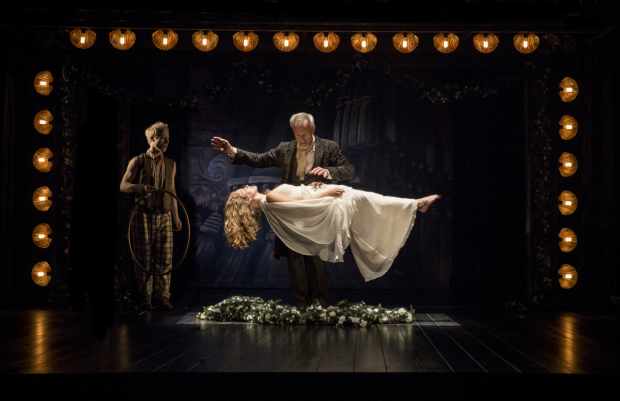The Tempest

(© Liz Lauren)
If there's a Shakespeare play that's a natural for magic, it's The Tempest. With a plot centered on a ruler with supernatural powers, the romance all but cries out for illusions. Put Teller – the single-named, less vocal half of duo Penn and Teller – on the artistic team, and you've got a Tempest with an intriguing pedigree.
Directed by Teller and Aaron Posner, Chicago Shakespeare Theater's production is an illusion-fueled marvel that evokes both the retro-charms of a vaudeville act and the big-budget spectacle of a Vegas extravaganza. Magic designer Johnny Thompson's collaboration with the directorial team peppers the production with levitating princesses, bowls of water that burst into flames, a cavalcade of vanishing and reappearing time pieces, books, scarves, and playing cards, and several stunts apt to make audiences fear for the well-being of the actors.
The story is set in motion by Prospero (Larry Yando), who is one of Shakespeare's more problematic heroes. Once the Duke of Milan, Prospero has been banished to sea by his traitorous brother, Alonso (John Lister). Alonso makes sure Prospero's ship isn't seaworthy, and takes over the dukedom, certain that the rightful ruler will drown. But Prospero doesn't drown. Along with his infant daughter, Miranda, he is instead shipwrecked on an enchanted island.
Prospero's island exploits unfurl in exposition more than a decade after his banishment. Miranda (Eva Louise Balistrieri) is now a young woman intensely curious about her roots. Prospero relates to his daughter how he murdered the witch who reigned over the island when he arrived, and took her slaves — the two-headed cannibal Caliban (Zach Eisenstat and Manelich Minniefee) and the puckish imp Ariel (Nate Dendy) — as his own.
Such imperialism may have played as heroism in the Elizabethan heyday of England’s imperial powers, but it’s troubling from a 21st century perspective. Miranda is wide-eyed with admiration as Prospero explains that he acquired magical powers (from a collection of charmed books), including the ability to control the weather. He has summoned a mighty storm, Prospero concludes, in order to shipwreck his brother on the island. With Alonso and his crew of drunkards and schemers stranded on the beach, Prospero sets a scheme of vengeance, love, and redemption in motion.
The key relationship in The Tempest isn't the romance that springs up between the winsome Miranda and Alonso's strapping young son Ferdinand (Luigi Sottile). Posner and Teller instead home in on the complicated friendship between Prospero and Ariel. The two are master and slave, but in Yando and Dendy's nuanced performances, it's clear that they also care for each other deeply. Dendy captures the rage and the affection that Ariel feels for Prospero. He looks elfin and ghostly, an ethereal will-o'-the-wisp who delights in stirring up trouble. As the show's magician-in-chief, Dendy's dazzling tricks are as confounding as they are entertaining. As Prospero, Yando is utterly believable as a monarch who instills fear as well as love in his subjects. This is a ruler capable of killing without batting an eye, and when he sends Alonso's ship to the bottom of the ocean in a blaze of fire and water, the moment is chilling.
Minniefee and Eisenstat create a stunning Caliban, moving together like a single organism, scuttling across the stage like some extraordinarily mutated crab. Often, it's tough to tell where one body ends and the other begins in the two-headed, four-legged monster they create. Having a pair of actors play Caliban is an ingenious decision on the part of Teller and Posner, and one that heightens the wondrous oddness of Prospero's world. The cast also has standouts in Ron E. Rains and Adam Wesley Brown as, respectively, the drunken clowns Stephano and Trinculo.
The show is immeasurably enriched by Tom Waits' and Kathleen Brennan's haunting score, a soul-jazz hybrid performed onstage by the band Rough Magic. Lead vocalists Liz Filios and Bethany Thomas create a glistening sonic backdrop that's part Edwardian Music Hall and part siren song. Set designer Daniel Conway's atmospheric space has a vaguely steam-punk aesthetic, colored with hints of backstage vaudeville. It's a world that's both strange and familiar and a fitting blend of the fantastical and the ordinary.
Many ensembles would wind up playing second banana to the fantastical elements of The Tempest – it's tough to compete with magic tricks that astound and music that quickly finds its way to your heart. But Chicago Shakespeare's ensemble is never once eclipsed by the sideshow-worthy spectacle surrounding it. This Tempest is a storm of sheer magic, and one you'll want to revel in.











